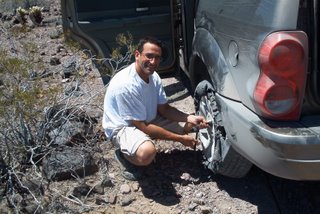However, I am not aware of any data suggesting that we will not be able to eat or to have a shelter and some clothe by 2050. Where is it?
Well, we can start with a report on historical crop yields per acre that's on the USDA website. I've got a copy of it and the URL on my laptop, but I don't have time to fire it up right now and configure it for my home network. I'll post it tomorrow if you can't find it.
Anyway, the data goes back to 1860 (when industrialization was already underway). What you see, especially when correlated with increased usage of nitrogen fertilizer (data also available on the USDA website), is that crop yields have increased between 400%-700% since that time. I've seen European data that was actually more telling, especially for Eastern Europe, but I do not know at this time where to find it again. IIRC, though, the crop yield increase there was substantial as a result of industrialized agriculture--roughly an 8-fold increase.
The correlation does not hold when looking at hybridization tables, or other such data. The reasonable conclusion, then, is that nitrogen fertilizer usage is primarily responsible for increased crop yields, and that once it becomes impossible for us to make those fertilizers artificially, our crop yields will decline significantly, leading to shortages of food and fibers for textiles.
Organic agriculture offers some hope on a small scale, but since I work in that industry, I can tell you that it's not scalable. It's impossible to farm large fields organically without the use of heavy machines and lots of under-the-table labor. One of the things that studies done on research farms don't usually tell you is that all of the well known farms have bunches of free labor in the form of students doing an internship. Without free labor, the farms would not exist as purely organic farms.
Getting the same yields through organic agriculture on, say, a 2 or 3 acre field is possible, but it is very difficult, and often it relies on leaving more to chance than is widely reported. Pesticides, especially, become important. If we posit that the really effective chemical pesticides will become unavailable sometime post-peak (as it seems reasonable to do), then we're left with using natural pesticides made of marigolds, tobacco, capsaicin, etc. Those work in a much more limited fashion, and in years with a heavy infestation of pest insects or fungi, crop yields must decline in Organic agriculture.
Not that I'm bashing organic methods. It's obvious that we must adopt them, and soon. But what we will find is that the promising studies to do with high crop yields were not done objectively, and that we will not be able to sustain the crop yields that we have now--especially when you consider the up-chain petroleum inputs. Biological controls do not occur naturally everywhere. On my garden, for instance, I'm getting ready to bring in some ladybugs from a distant source. They'll have to be shipped using petroleum. Once it becomes necessary to use such mechanisms to control pests on a wide scale, not only will we have immense difficulty finding enough of a given biological agent, we'll also have to ship it far and wide at great expense.
Nor will we be able to avail ourselves of clotches made of plastic, or of mulch fabrics made of the same, both of which are vital to high yield organic agriculture as it exists now. And there are plenty of other examples of vital inputs and devices that organic agriculture uses that rely on pretroleum. We won't have access to those at some point post-peak.
Do you think this will happen in the next ten thousand years? If yes, why?
If no, why do you even care?
I don't know whether it will happen in the next ten thousand years or not. But I care about people, whether they're people I know or not. I care about the human race in general. Regardless of spatial or temporal separation from people, I care about what happens to them. Are you trying to insinuate that I should not?






 )
)